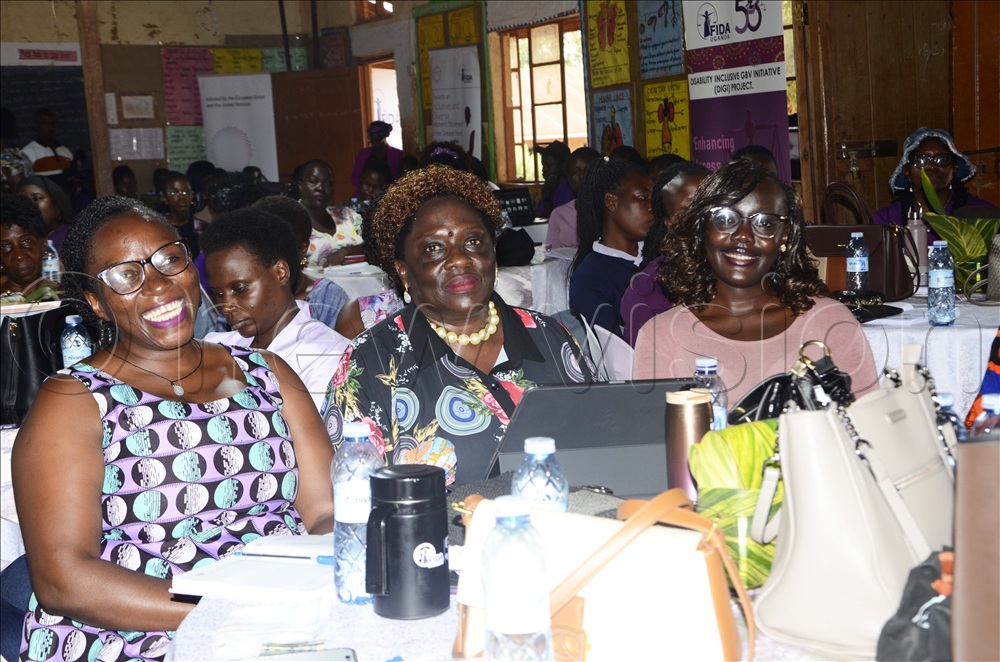Human rights defenders call for witness protection law
FIDA Uganda chief executive officer Liliane Byarugaba Adriko says not having witness protection, coupled with the absence of the national legal aid Bill, is a great barrier to access to justice for the poor and vulnerable.
Liliane Byarugaba Adriko, the FIDA Uganda CEO addressing journalists during the 51st Annual General Meeting (AGM) of FIDA -Uganda at Kazo Mixed Day and Boarding Primary School in Wakiso district. (Photos by Juliet Kasirye)
________________
To address the overwhelming demand for legal aid in various constituencies across the country, the Uganda Association of Women Lawyers have requested the Government to pass the witness protection law and the national legal aid Bill, which has been on the shelves for many years.
FIDA Uganda chief executive officer Liliane Byarugaba Adriko says not having witness protection, coupled with the absence of the national legal aid Bill, is a great barrier to access to justice for the poor and vulnerable.
Adriko said, the two laws will not only enhance access to justice in the communities but will also support the successful prosecution of cases. However, in the absence of such legislation, the delivery of legal aid remains fragmented, leaving family, civil and socio-economic rights cases often unaddressed.
“If we don’t have witness protection, cases are not only compromised, but perpetrators compromise the witnesses too. We end up with a society that does not have primitive measures because witnesses have been lost, and perpetrators then get to be recycled in the societies that we work in.” Adriko stated.
Economic driver
To enhance justice, Adriko says, “legal aid is in itself an economic driver. When you provide legal aid, you unlock capital through the court process, get resources and put them in the hands of women who constitute the larger percentage of people in production.”
She made the remarks during the 51st Annual General Meeting (AGM) of FIDA -Uganda at Kazo Mixed Day and Boarding Primary School in Wakiso district on Saturday, September 20, 2025.
Lucy Peace Nantume (left), Chairperson Board, Susan Okalany (centre), High Court judge ,Sarah Anzoa (right), Board member interacting during the 51st Annual General Meeting (AGM) of FIDA -Uganda at Kazo Mixed Day and Boarding Primary School in Wakiso district. 
The AGM that attracted members of FIDA, including female lawyers and judges, focused not only on fulfilling their statutory obligation, but also demonstrated that governance and accountability remain anchored in the lead experiences of the rights of the vulnerable people.
During the meeting, residents of Kazo and surrounding areas received free legal aid services delivered by lawyers, paralegals, and FIDA-Uganda’s partners.
Justice problems
According to the Justice Needs and Satisfaction in Uganda Report by HiiL, 2021, 84% of Ugandans experienced at least one serious justice problem in the last four years, but 70% of these issues were either not resolved or resolved unfairly.
“Only 34% of Ugandans are aware of legal aid services in their communities, while a mere 18% manage to access them annually. These stark figures expose a glaring disconnect between the legal rights guaranteed on paper and the lived experiences of millions of citizens,” the Advocacy and Communications Officer of FIDA-Uganda, Omega Aloyo Nyeko, said.
Nyeko added that the essence of a fair hearing extends far beyond the mere right to appear before a court. It presupposes access to legal representation, legal awareness, and the institutional capacity to provide remedies to those most marginalised. Yet these safeguards remain largely theoretical for the poor, rural, and vulnerable populations.
According to the 2024 annual report conducted by FIDA-Uganda, they resolved 15,015 civil cases, 6,371 criminal cases, 527 juveniles, secured six acres of land for clients and secured over sh740m in maintenance and compensation alongside recovery of property worth sh33m.
In addition, FIDA has provided legal aid to 21,913 clients, comprising 15,702 women and 6,211 men.
According to the report, the most prevalent cases handled in 2024 included: family maintenance had 1,018 (743 females, 275 males), child neglect and abandonment had 1,294 (1,019 females, 275 males), domestic violence had 2,593 (2,176 females, 417 males), land disputes had 2,663 of these (1,505 females, 1,158 males). Vulnerable groups reached with legal aid services include, Persons with disabilities (2,502), refugees (916), and children in contact with the law 527.
Since the most commonly reported cases largely affected women, the manager of Legal Aid Clinic, Susan Nabatte, said, it is vital to empower women economically to sustainably provide for their families as well as reduce their vulnerability to domestic violence and other forms of Gender Based Violence.
Funding gap
During the meeting, stakeholders expressed concern about the shrinking donor funding, saying it is hindering access to justice for marginalised communities.
To reduce donor dependence, the High Court Judge, Susan Okalany, asked FIDA to deepen local fundraising by institutionalising innovative initiatives such as digital crowdfunding and also cultivate philanthropic networks to help raise funds.
With the dwindling funding, Okalany disclosed: “We suffer so much with donor dependence, not because we don't get the resources, but sometimes, they cut these resources or the programme ends and renewing it takes a while. We really need diversified funding.”
As the Board chairperson, Okalany said they have agreed to secure the legal aid house, and as a strategic investment, while cautious about debt sustainability, the Board resolved to continue exploring alternative financing models, including support from philanthropists and a reallocation of institutional funds to get the legal aid house.
Sauda Luzinda Namubiru, a resident of Nabweru North II, experienced concern about her struggles to raise four children after her husband’s death.
“My husband died on November 1, 2024 and left me with children aged between 11, 12, 9 and 6 years. Since he didn’t make a will, my co-wife seized all the deceased’s properties, including the nine rentals and a parking space, claiming he left everything to her.” Namubiru stated.
Since children suffer most in property disputes, Namubiru requests law enforcement officers to intervene so that her children receive what they rightfully deserve.